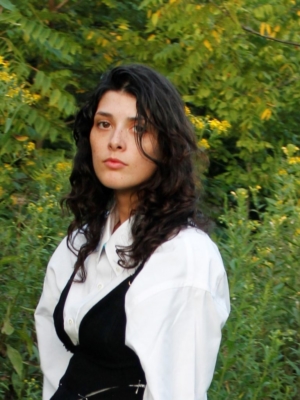The Deserters
[creative nonfiction]
We packed an ice chest and drove from civilization to a grave. We drove forty-five minutes to a sea in the middle of the desert. You said the Salton Sea was a mistake—an engineering failure that caused the Colorado River to flood the Imperial Valley in 1905. But the mistake seemed a blessing in disguise. Interest in the desert oasis grew. People invested in seaside real estate and by the fifties, it became a prime destination for both celebrities like Marilyn Monroe and bored suburbanites wanting a getaway. It should have been the Californian dream come true, but the dream, you said, was just that. It was beautiful. It was proof of the impossible. But it was fleeting. The sea had no outflow. No stabilization. The salinization bred blooms of botulism, an ocean of dead fish floating to the surface of the basin, and tourists fleeing in packs. Those who stayed in the wasteland saw their life expectancies plummet fifteen years from the poisoned air.
On the way to the sea, we stopped by a dollar store to purchase a tablecloth with orange plaid plastic that crinkled when we picked it up. The design was subtle, almost elegant compared to the others with brightly colored cartoon flowers. The material was thin but seemed durable. It almost convinced me it was nicer than it seemed.
From there, we drove an hour south to the seaside in the desert. I spread the tablecloth across a picnic table. My heels sunk holes in the sand as I stood, trying to smooth out wrinkles. You fanned yourself in the heat but didn’t remove your leather jacket. You took photos of my hands arranging the array of decadent foods like a still-life. I looked up but couldn’t see your face behind the camera.
We were anachronistic fixtures there—two breathing bodies dining by decomposed fish. The stench burned our noses as we sat on the bench beside them. We picked at Italian sausage, cheeses, and fruits across the plastic cloth. Brie oozed into a smooth cream on the plate, and I dipped strawberries against the gooey walls. Berry juice dribbled down my chin and onto my blouse, blooming like red algae across the white lapel. Flies admired the sweet treats too and delighted in the open spread, fluttering from the cheese to the salami. You tried to swat them away, but I laughed. I was happy to share.
You poured rosé into two plastic flutes and we cheered, clinking plastic rims and spilling a few drops on the tablecloth. The wine bled between our lips as we sipped. It was cool and dry and fermented, trickling down our throats.
The air was putrid, the shore was desolate, and I faded into a ghost of the fifties. The desert sea enraptured me as we ate. I imagined the decades of its fertility when tourists came seeking paradise. I remembered grainy photographs of people having picnics like ours by the shore, the fishermen catching tilapia from the sea, and the hope of an abundant future before the mistake manifested fatal consequences. A century since its birth, the paradise has since fallen.
We left in a daze, throwing the crumbled sandwich wrappers in a nearby trash can, tossing the leftovers back into the chest, and drove the hour back to your home. Once we returned, we opened the icebox on the kitchen island and saw the rosé uncorked itself, drowning the tablecloth. On impulse, you tossed it as though we couldn’t clean it for a future picnic. I guess you didn’t think it was worth it.
Kyrié Eleison is an Indigenous writer with an MFA in Creative Writing, Nonfiction, from University of California Riverside and a BA in Creative Writing from University of Cincinnati. She has words in The Nasiona, Boshemia Magazine, and Waxing & Waning, among other literary journals and has shared her work on stage at True Theatre. Find her in the void online @MsKyrieEleison





